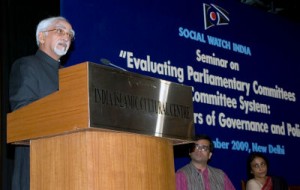Social Watch news
|
Published on Fri, 2009-12-11 06:57
Statement by the Third World Institute, a non-governmental organization in consultative status with the Economic and Social Council 11 December 2009 |
|
Published on Wed, 2009-11-25 03:00
NEW DELHI: In a scathing indictment of the parliamentary committee system, an independent report has said that leave alone acting as watchdogs, committees were vulnerable to manipulation. The report — Evaluating Parliamentary Committees and Committee System — prepared by the National Social Watch Coalition elaborates with examples how committees have been used by the government to serve its ends. |
|
Published on Mon, 2009-10-26 07:15
After September’s G-20 Summit in Pittsburgh, USA (detailed in the “News” section of this e-bulletin), the next meeting of this elite global club is scheduled to take place in Huntsville, Canada in June 2010. “Spotlight On…” will also turn its gaze to that North American country, with this month’s profile focused on Social Watch Canada. |
|
Published on Mon, 2009-10-26 07:09
Time has come. In the Social Watch 2009 Report, People First, members of the network from around the world have called on their Governments to retool the stimulus packages they received to face the global crisis so they increase wages, expand social security coverage for the most vulnerable, strengthen local enterprises, and assist family farmers. This month, the Social Watch General Assembly to be held in Ghana, will be an invaluable opportunity to discuss and plan the actions for a coordinated and effective action on both the national and international levels. |
|
Published on Tue, 2009-09-29 11:33
The Social Watch report 2009 was launched Friday, September 25, 2009 at the United Nations Plaza in New York. This year's Social Watch report from over sixty civil society organizations around the world, entitled People First, shows that the only way out of the current ecological and economic crisis is to devote resources to strengthening people's wellbeing. The launch was co-sponsored by NGLS, Amnesty International, Social Watch, Friedrich-Ebert-Stiftung and the Global Policy Forum. |
|
Published on Tue, 2009-09-22 08:48
SEPTEMBER 23, 2009 (PITTSBURGH, USA): The two major South-based international civil society networks Social Watch and Third World Network have jointly called on G-20 leaders to address and pledge to greater social and development investment and to enact a more thorough restructuring of the international financial institutions (IFIs). A deeper commitment to address social inequities and the asymmetric structures of IFIs is the most effective way to mitigate the dramatic social impacts of the current economic crisis and prevent future shocks. These networks, representing grassroots organizations in over 70 countries, will present their policy recommendations today September 23 at 12 noon at the Pittsburgh Renaissance Hotel (107 6th Street) in the run-up to the G-20 summit. |
|
Published on Fri, 2009-09-18 14:15
Social investment is the key to a just and effective solution to the current economic crisis, says citizens' alternative report PITTSBURGH, USA (September 23): Robust social investment programs should be enacted in order to effectively stimulate the global economy and mitigate the impacts of the financial crisis on workers, women and the poor, concludes the international civil society network Social Watch in its 2009 Report. This will not only satisfy criteria of social justice but also is sound economic policy, states the Report, titled People First. The report will be launched today, September 23 at 12 noon at the Pittsburgh Renaissance Hotel (107 6th Street) in the run-up to the G-20 summit. People First includes dozens of in-depth reports from grassroots civil society organizations, which prove that the poorest countries played no part in causing the crisis, yet they are experiencing its worst effects. The exclusion of these countries from forums such as the G-20 creates a further obstacle to implementing socially just policies. |
|
Published on Thu, 2009-08-20 10:53
As a representative of civil society, Roberto Bissio, coordinator of Social Watch, spoke at the Official Round Table at the UN Conference on the World Financial and Economic Crisis and its Impact on Development that took place June 24-26, 2009 in New York. |
|
Published on Wed, 2009-07-01 13:32
At the closing of the UN Conference on the Financial and Economic Crisis and its Impact on Development, governments adopted an outcome document reflecting months of negotiations. The following analysis looks at 7 key issues that civil society deemed crucial for the success of the conference. |
|
Published on Fri, 2009-06-26 15:18
NEW YORK - June 24, 2009 - Today, in an open dialogue with representatives of civil society, Prof. Joseph Stiglitz, Chair of the Commission of Experts of the President of the UN General Assembly on Reform of the International Monetary and Financial System, detailed many of the recommendations proposed by that Commission and in particular called for a “new intellectual framework” which can lay the basis for a new global financial architecture. |
SUSCRIBE TO OUR NEWSLETTER

 First published by
First published by 
